Posts Tagged ‘Paris expat’
May 24, 2012
–
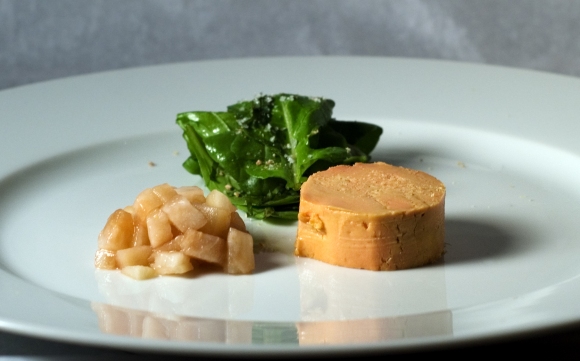 Moulard Duck Foie Gras with Pickled Pear. From the Wikpedia Commons. Photo by Luigi Anzivino.
Moulard Duck Foie Gras with Pickled Pear. From the Wikpedia Commons. Photo by Luigi Anzivino.
–
les souris – mice
maïs – corn; pronounced “mah-eese”
24h sur 24 (spoken aloud as “vingt-quatre heures sur vingt-quatre” or “vingt-quatre sur vingt-quatre“) – 24/7
(in French, they say “twenty-four hours out of twenty-four”, instead of “twenty-four/seven”)
foie gras – foie gras is a traditional French delicacy made from the liver of a duck or goose that has been specially fattened; literally translated, it means “fat liver”
gavage – force-feeding
bricolé(e) – thrown together, cobbled together, tinkered with (familiar); from the verb “bricoler”
–
******
–
The first time I met my friend Dave, he told me he’d been living in Paris for two years.
“Wow, your French must be really good by now,” I remarked enviously, still not feeling quite up to the task of speaking French 24h sur 24.
“Not really,” he replied. “Actually, you can get by quite well in Paris without speaking much French at all.”
Continue reading »
Posted in Canadian Expats, Expat Life, France, Paris | 1 Comment »
Tags: expat, expat impressions, expat life, France, French language, French vocabulary, Paris, Paris expat
May 5, 2012
–
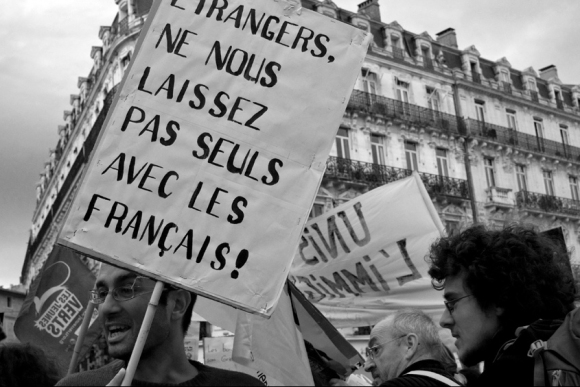 “Foreigners, don’t leave us alone with the French!” © 2010 Anne Petitfils
“Foreigners, don’t leave us alone with the French!” © 2010 Anne Petitfils
A strong opposition to immigration is one of the defining tenets of the Front National, the French far right,
a position which is met with much criticism from French socialists. Marine Le Pen, the party’s leader, sent shockwaves through the nation two weeks ago when she walked away with an unprecedented 17.9% of the national vote in the first round of this year’s presidential elections, although in the end it was
Nicolas Sarkozy (27.18%) and François Hollande (28.63%) who moved on to the second round.
–
une fête – a festival, a celebration, a party
un jour ferié – statutory holiday, civic holiday, public holiday, bank holiday
muguet – Lily of the Valley
faire le pont – literally “to make a bridge” (bridge a gap); an idiomatic expression used to describe the common French practice of taking a vacation day in between a statutory holiday and the weekend, thereby creating an extra-long weekend
le premier mai – the first of May
le syndicat – (trade) union
un ouvrier – a worker (historically, this term was used to refer to tradespeople or factory workers)
la classe ouvrière – the working class
une manifestation – a protest, a rally
le Palais d’Élysée – Élysée Palace, the official residence of the French president
Monsieur le Président – the proper way to address the French president, in the same way that English-speakers say “Mr. President”
le vrai travail – real work
la gauche – the left
un defilé – a parade, a march
le defilé syndical – the union parade
la crise – French shorthand for the current economic crisis or the recession
“travail, famille, patrie” – work, family, fatherland
l’extrême droite – the far right
le Front National – The National Front, the far-right political party in France. Their current leader is Marine Le Pen.
l’UMP – Union for a Popular Movement, the French political right. Nicolas Sarkozy, the current French president, is their leader.
le Parti Socialist – The Socialist Party, the French political left. François Hollande, current presidential contender, is their leader.
–
**********
–
“Do you hear the people sing, singing the song of angry men?
It is the music of a people who will not be slaves again.”
– “Les Misérables”, The Musical, Alain Boublil and Claude-Michel Schönberg
–
This past Tuesday was May 1, otherwise known as La Fête du Travail (better known in English-speaking countries as “Labour Day” but literally translated as “The Festival of Work[ers]”). It’s hard to believe that it’s been two whole years since I first learned all about this nationwide jour ferié and its various traditions, like offering friends and family a small bouquet of muguet or taking an extra day off work to faire le pont. The last time I wrote about le premier mai, it seemed to me like just one of many random holidays that made the month of May in France seem like one long drawn-out vacation. What with it falling smack dab in between the two rounds of this year’s French presidential elections, however, the day took on a far more serious and political tone than many have seen in recent memory.
You see, in addition to being a great opportunity to take a long weekend trip somewhere, I’ve recently learned that, at its core, la Fête du Travail is meant to celebrate workers and workers’ rights. In Paris, the various big syndicats have a long-standing tradition of getting together to organize a big rally every year on this day, with the intention of uniting les ouvriers and reminding them of the importance of the holiday’s origins, of what their predecessors fought for, and of the fact that there are still battles that need to be fought today. It’s something of a sacred day to the unions, a day that has always traditionally belonged to la classe ouvrière. This year, as usual, the syndicats were on track to organize a giant manifestation at Denfert-Rochereau in the south of Paris, culminating in a grand march to La Bastille.
–
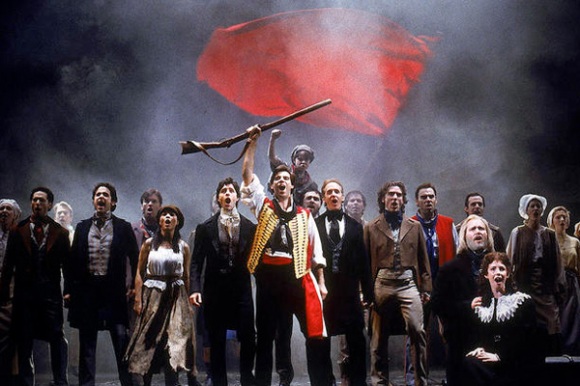 As a teenager, a high school field trip to watch the musical “Les Misérables” was my first introduction to French history, so it feels vaguely surreal to now be in Paris and witnessing strikes and marches happening along the very same city streets, carrying on the tradition of Victor Hugo’s famous unwashed poor.
As a teenager, a high school field trip to watch the musical “Les Misérables” was my first introduction to French history, so it feels vaguely surreal to now be in Paris and witnessing strikes and marches happening along the very same city streets, carrying on the tradition of Victor Hugo’s famous unwashed poor.
–
Continue reading »
Posted in Canadian Expats, elections, Expat Life, France, Paris | Leave a Comment »
Tags: 2012 French Presidential election, Canadian expats, Canadians in Paris, expat impressions, expat life, France, French culture, French language, French politics, French vocabulary, la fête du travail, le 1er mai, May 1st, Paris, Paris expat, the first of May
August 8, 2011

la pluie – rain
le temps – weather
Paris sous la pluie – Paris in the rain
jour après jour – day after day
maudite – damned; la maudite pluie – damned rain
un orage – a storm; a thunderstorm
un parapluie – umbrella
la météo – the weather report
trempé(e) – soaked; soaking wet
C’est pas normal ! – It’s not normally like this, it isn’t usually like this; This isn’t normal
Qu’est-ce qu’on peut faire ? C’est comme ça. – What can you do? It’s just how it is.
il pleut des cordes – it’s raining cats and dogs (literally “it’s raining ropes”)
******
I snapped this photo back in December, but I might as well have taken it yesterday, given the temps we’ve been having lately. Springtime here was unseasonably warm and gloriously sunny, but ever since we officially hit “summer”, jour après jour, it feels like there’s been nothing but la maudite pluie. After a month of almost daily orages, even when la météo predicts that it’ll be nice out, I don’t dare leave the house without my parapluie, for fear I’ll end up completely trempée.
“C’est pas normal !” my French friends keep saying, clucking their tongues in disapproval and shaking their heads reproachfully at the sky. “The weather in July is usually so much better than this.”
Oh well, qu’est-ce qu’on peut faire ? C’est comme ça. Even sous la pluie, Paris is still beautiful, and although picnics might be off the table for now (pun intended), there are always the city’s many museums, art galleries and ornate covered passages available for frittering away a rainy afternoon.
And every cloud has a silver lining: When il pleut des cordes and I’m stuck indoors, it’s an effective cosmic kick in the pants to finally start sorting through the literally hundreds and hundreds of photos that I’ve taken since I got here… hence the photo from December, which I now get to share with you!
–
 Paris souvenir vendors are well-prepared for the inclement weather.
Paris souvenir vendors are well-prepared for the inclement weather.
––
Posted in Expat Life, France, Paris, pluie, rain | 6 Comments »
Tags: expat impressions, expat life, France, French language, French vocabulary, Paris, Paris expat, pluie, rain
July 24, 2011
– –
–
un trois quart – a three-quarter (in this case, a three-quarter length coat)
la période de soldes – sales period
faire les magasins – to go shopping or tour the stores; literally translated: “to do the stores”
les soldes – the sales
les soldes d’été – the summer sales
les soldes d’hiver – the winter sales
une foire d’empoigne – free-for-all
une bonne affaire – good deal
faire des folies dans les magasins – to go on a shopping spree
les riches – the rich, the wealthy
(la) première démarque – first markdown
(la) deuxième démarque – second markdown
(la) troisème démarque – third markdown
(la) dernière démarque
soldé(e) – on sale
faire les soldes – to shop the sales
j’ai fait un peu les soldes – I shopped the sales a little
se faire plaisir – to treat oneself; (nous faire plaisir – to treat ourselves)
la crise – literally “the crisis”; French shorthand for the current economic crisis –
******
“Last Saturday, the sales started,” my friend Julien wrote me last January. “I bought two suits, four shirts and ties, a coat (un trois quart) and a pair of shoes to be even more elegant than I was.”
–
“J’ai besoin d’un nouveau paire de baskets et quelques trucs pour l’été,” my friend Anne mentioned to me last month, while we were waiting in line for an event at the Palais Brongniart. “Mais j’attends les soldes.” (“I need a new pair of sneakers and some things for the summer, but I’m waiting for the sales.”)
Santa’s not the only one who’s making his list and checking it twice. Parisians do it too and not just at Christmas. That’s because twice a year, every January and June, it’s the période de soldes in France and all over Paris, savvy shoppers in search of a bargain get out their wish lists, put on their comfiest shoes and brave the crowds to faire les magasins.
Unlike in North America, sales in France are strictly legislated. (For a culture known for its love of flaunting the rules, I am discovering, the French sure have a lot of them.) Stores in France are not allowed to hold sales anytime they want. Instead, they are limited to two annual designated “sales periods” that are known as les soldes: five weeks beginning the last Wednesday in June for the soldes d’été, and five weeks beginning the second Wednesday in January for the soldes d’hiver.* If you’re Canadian, it’s the equivalent of five solid weeks of Boxing Day sales. If you’re American, it’s like five weeks of Black Friday.
–
Continue reading »
Posted in France, French culture and traditions, Paris, Shopping, Shopping | 1 Comment »
Tags: Canadian expats, Canadians in Paris, culture, expat impressions, expat life, France, French culture, French language, French traditions, French vocabulary, Paris, Paris expat, sales, shopping, soldes
July 15, 2011
 –
–
Concorde métro station
le trajet – commute
ensemble – together
Et si on faisait le trajet ensemble ? – What if we made the commute together?
******
I’m in love with this little film, posted in the Francophilia Gazette yesterday, which simultaneously depicts a commute happening in Paris with one happening in New York. The fact that Tolbiac, the first métro station that appears in the Paris “half”, is right in my neighbourhood makes it seem even more special.
–
Whether you’re waking up on this side of the ocean to a café crème and a fresh croissant, or on the other side of the Atlantic to a cup of Timmy’s and a toasted bagel with cream cheese, it’s somehow comforting to know that morning commutes remain universal.
Et si on faisait le trajet ensemble ? I’ll be thinking of all of you back home when I make mine on Monday morning!
Posted in France, New York, Paris, Travel | Leave a Comment »
Tags: Canadian expats, Canadians in Paris, expat impressions, expat life, France, French culture, French language, French vocabulary, New York, Paris, Paris expat, short film
June 20, 2011
la France (proper noun, feminine) – France; in the French language, countries are typically preceded by their defining article (i.e. “le Canada”, “la Bolivie”)
la pelouse (noun, feminine) – the grass; the lawn
le terroir – (noun, masculine) land; soil; terrain
le(s) produit(s) du terroir – (noun, masculine) regional product(s)*
le brie – (noun, masculine) Brie cheese
la Brie – (proper noun, feminine) the region of Brie, in France; note that this is distinguished from the cheese by the change in gender, that is, the cheese is masculine and the region is feminine
le chèvre – (noun, masculine) goat’s cheese
la chèvre – (noun, feminine) a goat; note that this is distinguished from the cheese by the change in gender, that is, the cheese is masculine and the animal is feminine
un(e) gourmand(e) – (noun, masculine/feminine) a foodie; someone who is fond of good food
les flics – (noun, masculine; slang) the cops
interdite – (adj) prohibited, forbidden
une abeille – (noun, feminine) a bee
un repos – (noun, masculine) rest; time off
la Mairie de Paris – Paris City Hall
le gazon – (noun, masculine) grass; turf; lawn
hivernal – (adj) winter
autorisée – (adj) authorized
déjeuner sur l’herbe – to have a picnic lunch on the grass (literally “to lunch on the grass”)
******
“Mangez sur l’herbe
Dépêchez-vous
Un jour ou l’autre
l’herbe mangera sur vous”
-Jacques Prévert
–
(“Hurry up, picnic on the grass; one of these days, the grass will picnic on you.”)
–
La France is famous around the world for its many luxury exports and high-end products. Most of us at some point or another have probably already encountered its produits du terroir without even realizing it: champagne from France’s Champagne region, for example; or Dijon mustard, named after the city of Dijon; or perhaps a glass of Bordeaux wine from – you guessed it – Bordeaux. There are, of course, its many cheeses: Camembert, from Normandy, Brie from the region of Brie, and (a personal favourite) countless varieties of chèvre, just to name a few. For the gourmands out there, there’s caviar and foie gras, and to satisfy the fashionistas, a long tradition of haute couture, world-renowned fashion houses like Chanel, Hermès and Louis Vuitton… and the ever-ubiquitous sac Longchamps, the go-to “It” bag that seems to accompany every American tourist home.
Yes, France has no end of premium luxury products of which it can boast. But as I discovered shortly after moving here, it also has one precious commodity that you’ll never read about in the tourist brochures or find listed with the AOC, a commodity so sacrosanct that it is protected fiercely everywhere in Paris by local edict, by chain-link fences and other physical barriers designed to ensure its security, by intimidating signage that prohibits the public from tampering with it, and, if that isn’t enough to discourage the common riffraff from interfering with this national treasure, by les flics, who are quick to put a stop to any shenanigans on the part of heretic tourists who may have wandered into its sacred midst.
I am, of course, talking about the grass, or as the French call it, la pelouse.
 “Keep Off The Grass”
“Keep Off The Grass”
Continue reading »
Posted in culture, France, Paris | 4 Comments »
Tags: culture, expat, expat impressions, expat life, expatrié, France, French language, French life, French vocabulary, grass, grass prohibited, improve French vocabulary, keep off the grass, l'herbe, le gazon, learn French, learn the French language, Paris, Paris expat, Paris life, pelouse, pelouse au repos, pelouse interdite, repos hivernal
September 30, 2010
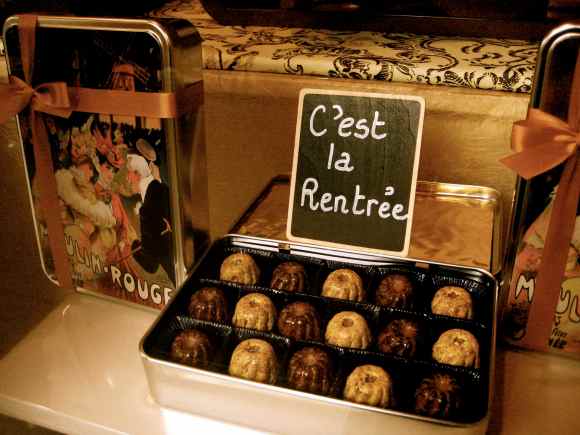 September can be like a box of chocolates – you never know what you’re going to get.
September can be like a box of chocolates – you never know what you’re going to get.
–
rentrer – to come back, to go back, to return home
la rentrée – “the re-entry”; refers to the period in September when everybody is coming back from vacation and returning to work or school
les vacances – vacation; also refers to the month-long holiday break that many French people take in the summer
l’energie (féminin) – energy
le farniente – an Italian word that has been adopted by the French, the art of lazing about and doing nothing
un projet – project, endeavour, undertaking
un défi – a challenge
une boulangerie – a bakery
une boîte (familiar) – firm/company, office
rouler – to run (as in function)
Allez, c’est parti ! – All right, and we’re off/here we go!
une chambre de bonne – a “maid’s room”; many old residential buildings in Paris have what used to be servants’ quarters converted into low-cost one-room rental units (often for students)
une plaque – an electric stovetop burner; a hot plate
faire du lèche-vitrine – window-shopping (literally “window-licking”)
Je faisais du lèche-vitrine… – I was window shopping…
une nouvelle robe pour la rentrée – a new dress for la rentrée
******–
“The year does not begin in January. Every French person knows that. Only awkward English-speakers think it starts in January. The year really begins on the first Monday of September.”
– Stephen Clarke, A Year in the Merde
–
There’s something about the arrival of September that always makes me want run out and buy myself a brand-new box of pencil crayons. This impulse doesn’t actually make any sense, as it’s been years since I’ve taken an art class, and I can’t remember the last time I picked up a sketchbook. Yet for some reason, without fail, every September I am struck with the overwhelming urge to run to the local art supply store and buy myself a pretty new set of coloured pencils, preferably in a shiny tin case like the one I used to carry back in grade school. Something about the sight of them, pristine, freshly sharpened, and lined up neatly in a row like an obedient regiment of soldiers, has become inexplicably linked in my mind with the idea of fresh starts and possibility… a perfect metaphor for my feelings about September.
Continue reading »
Posted in Canadian Expats, Expat Life, France, French culture and traditions, la rentrée, Paris | 4 Comments »
Tags: Canadian expats, Canadians in Paris, expat impressions, expat life, France, French culture, French language, French traditions, French vocabulary, la rentrée, Paris, Paris expat
August 19, 2010
 Store Window, Montmartre, Paris
Store Window, Montmartre, Paris
les vacances – vacation
une fermeture – closure
la Mairie de Paris – Paris City Hall
un embouteillage – traffic jam
le supermarché – supermarket, grocery store
une fermeture exceptionnelle – unexpected or extended closure; an “exceptional” closure, outside of the regular operating schedule
l’Hôtel de Ville – City Hall
la plage – beach
les quais de la Seine – the quays of the Seine
******
Do you remember the creepy opening scenes of the film 28 Days Later? They caused a stir among critics and sent a chill down the spines of audience members everywhere because they depicted, in very realistic fashion, the always-bustling London landmarks, Westminster Bridge, Piccadilly Circus and Oxford Street, utterly devoid of human life. The simple, surreal absence of people in such famously and characteristically overcrowded spots was eerier than anything Jerry Bruckheimer could have pulled out of his bag of over-the-top tricks.
Well, those famous scenes are kind of what Paris feels like in August. Public spaces that are normally bursting to overflowing with people now appear vast and empty. While passing through the central métro station Châtelet the other day, I could have sworn I heard the opening theme from The Good, the Bad and the Ugly playing as a piece of tumbleweed drifted by.
Continue reading »
Posted in culture, Events and Outings, Expat Life, France, French culture and traditions, French holidays, les vacances, Paris, summer | 1 Comment »
Tags: August, August in Paris, Canadian expats, Canadians in Paris, culture, expat impressions, expat life, fermeture exceptionnelle, France, French language, French traditions, French vocabulary, les vacances, Paris, Paris expat, Paris Plage, Paris Plages, summer, summer holidays, summer vacation
July 22, 2010
 “My “14 juillet” souvenirs
“My “14 juillet” souvenirs
la fête nationale – national celebration
le 14 juillet – the 14th of July
le bal des pompiers – fireman’s ball
un pompier – fireman
un defilé – parade
le parfum – flavour
une gueule de bois – hangover (familiar)
un bonnet – bonnet, cap, head covering
une bavette – flank (steak)
papoter – to chatter
le feu d’artifice – fireworks
******
–
A mere four hours after getting home from the July 13 pre-fête nationale Bal des pompiers, just as I was finally drifting off to sleep, my phone rang. It was my friend Floriane, with the wake-up call I had requested. She had received a V.I.P. invitation to watch the big defilé along the Champs-Elysées at a very special reception being held in one of the offices above the grand boulevard, and she had invited me to be her guest. “Coucou Darlene, tu viens de te reveiller ? ” (“Hi Darlene, did you just wake up?”) she asked me sweetly, obviously bright-eyed and bushy-tailed, having had the good sense to skip the bal the night before. “Euh… non…” I fibbed. “J’arrive…” (“I’m coming.”)
I dragged myself, slowly, painfully, out of bed, cursing military parades and their early start times. Why? Why start a parade at 9:00 a.m.? What was wrong with a 1:00 p.m. parade? Or even better, a 4:00 p.m. parade?
Thirty minutes and two large cups of caffeine later, I left to meet Floriane. Having consulted Google Maps the night before, I knew that the address was a fifteen-minute walk or a mere five-minute Métro ride away. I had also checked the RATP (the Paris métro) site the night before and knew that my nearest subway station wasn’t closed, so I was all good. Or so I thought.
Continue reading »
Posted in Events and Outings, Expats in France, France, French culture and traditions, French holidays, Paris | 2 Comments »
Tags: 14 juillet, bal des pompiers, Bastille Day, Canadian expats, Canadians in Paris, Champs-Elysées, défilé, expat life, fête nationale, fireman, fireman's ball, firemen, France, French culture, French language, French traditions, French vocabulary, holidays, military, national celebration, parade, Paris, Paris expat
June 20, 2010
–
hôtel de ville – city hall
un centre d’animation – community centre
la vraie gastronomie française – real French gastronomy
A votre santé ! – Cheers! (Literally, “To your health!”)
haute cuisine – literally, “high cooking”; elaborate or skillfully prepared food (especially that of France); artful or elaborate cuisine
manger sur le pouce – to have a quick bite to eat
une crêpe salée – a savoury crepe, sometimes sold wrapped in wax paper “to go” at little stands and shops around Paris
à emporter – to go
–
********
–
“Alors je m’étais lancé, je l’avais invitée
Dans le meilleur Quick de la région
A boire en grand seigneur un milk shake à la banane
Dans des grands verres en carton”*
– From the song “Carpe Diem“ by Aldebert
–
–
One of the cool things about living in Paris is that, since it is one of the most touristed cities in the world, at any given time there’s almost always bound to be a friend passing through on vacation to keep me from getting too homesick. This week my friend and former chiropractor Sarah was in town, so I did my best to show her a good time. Wednesday, we spent the morning window shopping in the Marais and then I took her to Montmartre and Sacre Cœur, which, much to my amazement and despite her many visits to Paris, Sarah had never seen before.
––
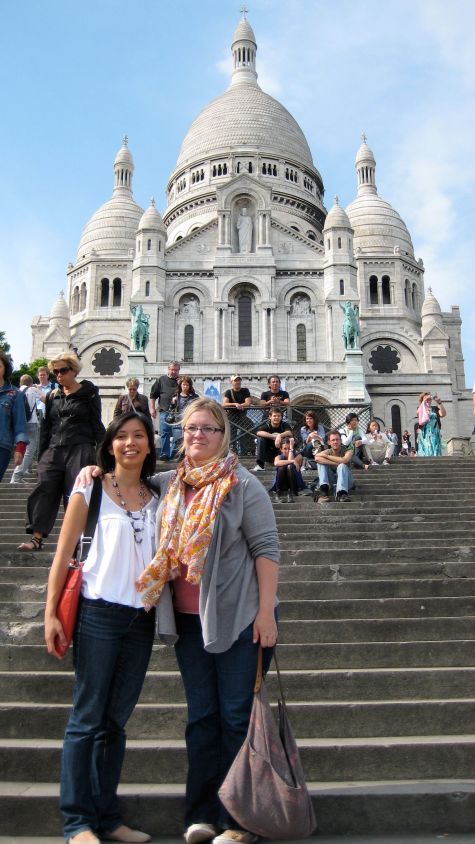 Sarah and I on the steps of Sacre Cœur
Sarah and I on the steps of Sacre Cœur
–
Now, I realize that hanging out with your chiropractor is not really something that everyone does, but sometimes life brings you friends in unexpected places and you just have to roll with it. It no longer seems strange to me, but it can occasionally be a bit weird to explain to people at first. Sometimes I get tired of the usual awkward: “Uhhhh, she was my chiropractor… and we really got along, so…” and am tempted to mix things up with a bit of humour. On the steps of Sacre Cœur, when two friendly tourists struck up a conversation and asked us how we knew each other, it took all my willpower not to listen to the mischievous imp on my shoulder and answer cheekily, “I was once half-naked on her table. There was oil involved.” For some reason, I felt that response might be misconstrued. Continue reading »
Posted in Expat Life, Food, Food, France, Museums Shows and Exhibitions, Paris | 5 Comments »
Tags: Canadian expats, Canadians in Paris, centre d'animation, eating, exhibitions, expat impressions, expat life, fast food, food, France, French culture, French language, French vocabulary, Gérard Uféras, Hôtel de Ville, love, Ménilmontant, Montmartre, Paris, Paris d'Amour, Paris expat, Quick, Sacre Cœur
 Moulard Duck Foie Gras with Pickled Pear. From the Wikpedia Commons. Photo by Luigi Anzivino.
Moulard Duck Foie Gras with Pickled Pear. From the Wikpedia Commons. Photo by Luigi Anzivino.

 As a teenager, a high school field trip to watch the musical “Les Misérables” was my first introduction to French history, so it feels vaguely surreal to now be in Paris and witnessing strikes and marches happening along the very same city streets, carrying on the tradition of Victor Hugo’s famous unwashed poor.
As a teenager, a high school field trip to watch the musical “Les Misérables” was my first introduction to French history, so it feels vaguely surreal to now be in Paris and witnessing strikes and marches happening along the very same city streets, carrying on the tradition of Victor Hugo’s famous unwashed poor.
 Paris souvenir vendors are well-prepared for the inclement weather.
Paris souvenir vendors are well-prepared for the inclement weather. –
– –
– “Keep Off The Grass”
“Keep Off The Grass” September can be like a box of chocolates – you never know what you’re going to get.
September can be like a box of chocolates – you never know what you’re going to get. Store Window, Montmartre, Paris
Store Window, Montmartre, Paris “My “14 juillet” souvenirs
“My “14 juillet” souvenirs

